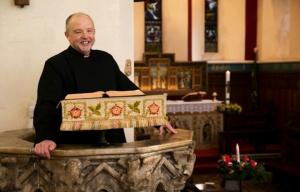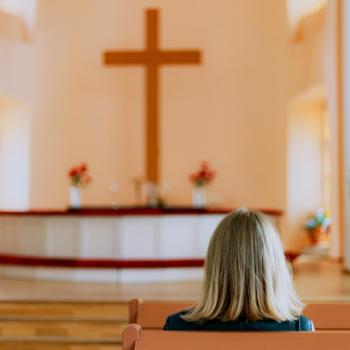
Photo by Centre for Ageing Better via Unsplash
Maybe you have a couple of older adults in your church who require walking or general movement assistance. Their spiritual health is just as important as their physical health, but inaccessibility can prevent them from coming to church. However, you can make the church building more accessible to protect them from risks of injury. Here are some strategies and interventions for fall prevention for older adults.
Know How to Assess a Fall
While you may do your best to prevent falls and keep your loved one safe, accidents sometimes happen. Know how to assess a fall so you can seek medical care if needed after a fall. At least two people in the church should know the proper protocol for assessing a fall.
Slips and falls can cause a range of minor and significant injuries including fractures and concussions. An older adult who has experienced a fall may feel more anxious about falling again and struggle with mobility or independence.
In the event that it happens, here’s how to assess a fall:
- Conduct a physical exam and check for bruises, injuries, pain or range of motion in limbs.
- Check for signs of head trauma like confusion, sensitivity to light or noise, dizziness or balance issues.
- Ask if they are experiencing headaches.
- Take vital signs like breathing, blood pressure, pulse and orthostatics.
- Make a note of any concerns to watch out for if nothing shows yet.
- Get their family or caretaker to reasses them after 24 hours for any signs of redness, swelling or pain.
- Seek medical help if they have an injury or concerning symptoms.
There’s also a protocol for older adults who have experienced a fall. Determine the cause of the fall and devise a strategy to prevent it from happening again. This could be providing more support with specific activities, adjusting medications that cause loss of balance, going for physical therapy and providing more opportunities to walk regularly or do particular exercises according to a physician’s instructions.
Secure the Entrance
Fall prevention starts at the door. Ensure all entrances have non-slip rugs or anti-slip pads to keep them secure. Otherwise, it’s best to remove them. On a regular day, anyone might trip on a rug but it’s imperative to protect older adults from falls by taking this precaution.
Make sure you clean any spills or wet floor surfaces immediately. In winter, it may help to have mats with more grip to prevent puddles from ice and snow.
Use Safety Measures Inside the Church
To prevent falls, you must think ahead and consider what parts around areas with high traffic or seating may cause falls. Most older adults susceptible to falls require extra handrails or grab bars to keep them steady when they move around. Areas like stairs especially need sturdy handrails for them to hold on to.
If your media center is at the back of the church, ensure all extension cables and electrical cords are put away safely, under carpeting or hidden to prevent falls. It’s also good to provide low-wall lighting if you predominantly use artificial lighting in the church hall. This is so that they can see where they are going if they need to go to the bathroom or move from their seat to another place.
Provide special seating if several older adults require assistance and fall prevention. Getting lift chairs to help them get in and out of their seats may also be a worthwhile investment.
Employ Safety Measures for the Bathroom
Older adults will likely have safety measures in their bathrooms at home to prevent falls. They will likely have. Make the church building more accessible with specialized stalls with raised toilet seats and grab rails to help them sit. The standard height for accessible toilets is 17 to 19 inches and a toilet should have a grab bar close by to help them move around. Replace regular towel racks with more secure grab bars and put extra where needed.
If the floors are tiled, put a non-slip rubber matter for underfoot grip and ensure that the bathrooms are always well maintained and without any leaks or spills. Spills are a major cause of falls, but they are preventable with extra precaution.
Facilitate Exercise Programs or Support Groups
As much as it is essential to make environmental modifications to protect loved ones from slips and falls, they also need support in other ways to reduce their chance of falling. Being socially active can prevent loneliness, depression and social isolation, which can lead to reduced physical activity and a higher chance of falling.
Find ways to keep them mentally, emotionally and physically healthy with support groups or programs hosted by the church.
Some ideas for programs include:
-
- Weekly exercise group: Exercise can improve their balance, flexibility and strength. In fact, older adults who exercise are 23% less likely to fall or experience fall because of better balance. It can also boost their self-confidence and help them overcome anxiety over falling. Group exercise can also keep them emotionally well from social contact.
- Vibrant events or meetings: Set a few yearly meetings dedicated to older adults. Perhaps a bingo night, card night or worship event. This gives them the opportunity to meet with other older adults and keep church friendships alive.
- Group counseling or educationally: Provide educational sessions about managing health with tips for maintaining a healthy diet and staying hydrated, daily exercise and good sleep habits. Although there may be education initiatives in your community, it helps to give them information with supporting scripture or spiritual practices like prayer and meditation to include in their health journey.
Keep Your Loved One Safe and Prevent Falls at Church
Taking a proactive approach to preventing falls for older adults can prevent severe consequences that would otherwise affect their overall health, well-being and quality of life. Using both environmental and social interventions and strategies, you can support your loved ones and create a safer space for them.













